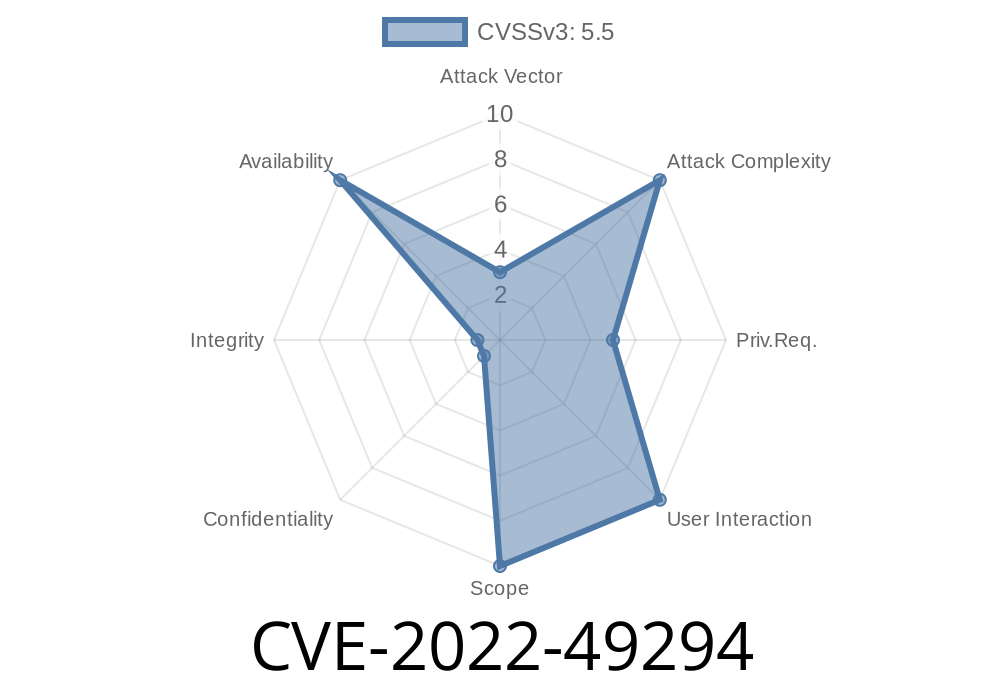In early 2022, security researchers and Linux kernel developers patched a low-level bug affecting the AMD display subsystem in the Linux kernel—tracked as CVE-2022-49294. This bug, found in the drm/amd/display driver, could result in a divide-by-zero error and trigger a kernel panic. Although the bug is simple, divide-by-zero mistakes in kernel modules may be exploited to crash systems or launch denial-of-service (DoS) attacks.
This post breaks down what CVE-2022-49294 is, how it happens, the original code that causes it, how it was fixed, and what it means for real Linux users – all in plain American English.
What is CVE-2022-49294?
The short version:
CVE-2022-49294 is a vulnerability in the Linux kernel's AMD GPU display driver code. Due to a missing check, the kernel might divide by zero if it reads a value from hardware that's unexpectedly set to zero. If this happens, the kernel crashes immediately—causing a full system halt.
How Did This Happen?
In certain GPU code paths, the AMD display driver performs a division. But before dividing, it’s crucial to make sure the divisor (the number you divide by) isn’t zero. This check was missing.
Here's the developer's summary from the patch (source):
> If a value of is read, then this will cause a divide-by- panic.
Vulnerable Code Before the Patch
Here’s an example of code that can cause the crash (simplified from the real kernel code – this isn’t a copy-paste, but shows the mistake):
// Simplified example
int value = read_some_hardware_register();
int result = some_value % value; // <- Can crash if value ==
int quotient = some_value / value; // <- Can crash if value ==
If value comes back from hardware as , Linux does what any C program would:crash with a divide by zero.
How Was It Fixed?
The fix is as basic as it gets: check if the divisor is zero before dividing.
The actual patch (see it here) adds an if statement to prevent division by zero:
// Vulnerable code:
int result = numerator / denominator;
// Fixed code:
if (denominator == ) {
// handle error or skip
} else {
result = numerator / denominator;
}
And in the real kernel, it’s more like
if (modulo == ) {
// Don't divide; maybe return an error, or use a default value
} else {
result = some_val / modulo;
}
Exploit Details
Because the buggy code was in the hardware display path, you would likely need privileges (root or kernel module) or a specially crafted environment to trigger the bug. That means a normal web user or unprivileged program probably can’t trigger it directly—but anyone with access to kernel APIs, or who could tamper with device drivers, could crash the system.
What does an exploit look like?
A simple “exploit” would just set up the GPU or fake the hardware state so the register returns zero. Here’s what would happen:
An attacker manipulates the hardware register (maybe by tricking kernel code or using another bug).
2. The code in drm/amd/display tries to divide by zero.
The attacker succeeds in bringing down the system.
Impact:
Am I Affected? Should I Worry?
If you run Linux on hardware with an AMD GPU, and your kernel is from before the patch (Nov 2022), upgrade your system. All major Linux distros have backported this fix.
Non-AMD users or those on up-to-date distros are safe.
References & Further Reading
- CVE-2022-49294 MITRE page
- Upstream Linux kernel patch
- AMD Display Core code in Linux
- Divide by Zero vulnerability explained (Wikipedia)
TL;DR
CVE-2022-49294 was a divide-by-zero bug in AMD's Linux display driver. If triggered, it would crash Linux. The fix: add a simple check before dividing. Update your system, especially if you use an AMD GPU on Linux systems.
Remember: Even “minor” bugs like this can have big impacts, especially in critical kernel code. Keep your Linux systems patched!
If you want to dig deeper or look at the original patch, check out the kernel git commit here.
Timeline
Published on: 02/26/2025 07:01:06 UTC
Last modified on: 04/14/2025 20:08:00 UTC
